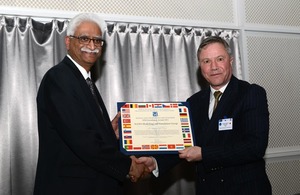UK targets Russian airlines with new sanctions
- New sanctions on major Russian airlines prevent them from cashing in on landing slots at major UK airports worth up to £50 million
- Sanctions are crippling Putin’s ability to wage war, disrupting vital supply chains
The UK Government has announced today (Thursday 19 May 2022) that it is introducing new sanctions against the Russian airline sector. State-owned Aeroflot, Russia’s largest airline, Ural Airlines and Rossiya Airlines will now be unable to sell their unused, lucrative landing slots at UK airports – preventing Russia from cashing in on an estimated £50 million.
Foreign Secretary Liz Truss said:
As long as Putin continues his barbarous assault on Ukraine, we will continue to target the Russian economy. We’ve already closed our airspace to Russian airlines. Today we’re making sure they can’t cash in their lucrative landing slots at our airports. Every economic sanction reinforces our clear message to Putin – we will not stop until Ukraine prevails.
The news comes as the Transport Secretary, Grant Shapps takes up Presidency of the International Transport Forum which he will use to call for a united response against Russia’s invasion of Ukraine.
Transport Secretary Grant Shapps said:
The UK was one of the first nations to implement sanctions on Putin and his allies; we forbade entrance to their ships and planes, strangling them of the privilege to benefit from global trade and commerce.
Today, the UK Government has built on the strong action we have already taken against Russia’s flagship carrier Aeroflot, along with Rossiya and Ural Airlines. This means they will be unable to use their expensive landing slots at UK airports. Our actions will also prevent Russia from selling the slots, and cashing in on up to £50 million.
Today’s announcement is the latest round of UK sanctions to ensure that Russia cannot benefit from the UK’s world class aviation and transport industries – having previously banned Russia from the UK’s airspace and waters and banned the export of aviation goods and technology.
International sanctions are having a significant impact on Putin and his war machine. Russia’s own Central Bank has admitted that sanctions are a major challenge for Russian supply chains. Sanctions mean that:
- several Weapons manufacturers having to suspend their activity due to a lack of parts
- defence company capabilities are restricted, limiting Russia’s ability to replace advanced tech, including drones
- Russia’s domestic vehicle sales have dropped by 80% partly due to a lack of components – which is also reducing their ability to produce military vehicles
Russia’s vital exports of energy are also shrinking – with crude oil exports down 30% in April and expected to fall further as sanctions bite. Through co-ordinated action across the G7 to phase out oil imports, alongside the banning of critical oil refining and catalyst goods, international allies are tightening the vice on Putin’s most trusted revenue stream.
Hard hitting economic sanctions are also having a long term impact on Russia’s economy. While the Kremlin has managed to stabilise the rouble, Russia is still heading for the deepest recession since the collapse of the Soviet Union. Forecasts show Russia’s GDP shrinking by between 8.5% and 15% this year, with the IMF expecting the economy to shrink a further 2.3% in 2023.
Background
Asset freeze
An asset freeze prevents any UK citizen, or any business in the UK, from dealing with any funds or economic resources which are owned, held or controlled by the designated person. UK financial sanctions apply to all persons within the territory and territorial sea of the UK and to all UK persons, wherever they are in the world. It also prevents funds or economic resources being provided to or for the benefit of the designated person.
Travel ban
A travel ban means that the designated person must be refused leave to enter or to remain in the United Kingdom, providing the individual is an excluded person under section 8B of the Immigration Act 1971.
Transport sanctions
Recently introduced powers make it a criminal offence for any Russian aircraft to fly or land in the UK, and give the government powers to remove aircraft belonging to designated Russian individuals and entities from the UK aircraft register, even if the sanctioned individual is not on board. Russian ships are also banned from UK ports.
Sanction Profiles
-
Aeroflot, Russia’s largest airline and among the top 20 largest airlines in the world. It is majority owned by the Russian state, and is carrying on business in the transport sector, which is of strategic significance to the Russian Government. Aeroflot not only provides services for the Russian Government, but also generates an important source of revenue for the Kremlin. The UK, along with international partners, sanctioned the CEO of Aeroflot Mikhail Igorevich Poluboyarinov in March. Aeroflot is subject to an asset freeze.
-
Rossiya Airlines, otherwise known as Russian Airlines, is one of Russia’s oldest and largest airlines, and is a part of state-owned Aeroflot. Therefore, Rossiya Airlines is carrying on business as a Russian Government-affiliated entity, and is involved in obtaining a benefit from or supporting the Government of Russia. Rossiya Airlines is subject to an asset freeze.
-
Ural Airlines, one of the largest airlines in Russia, and was previously part of Aeroflot. It is obtaining a benefit from and supporting the Government of Russia by carrying on business in the transport sector, which is of strategic significance. Ural Airlines is subject to an asset freeze.
